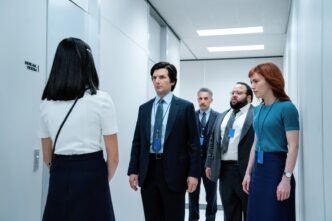Luca Guadagnino directs “Challengers,” a time-shifting drama about a love triangle between tennis pros. The film stars Zendaya, Josh O’Connor, and Mike Faist as young adult tennis players who become caught up in a messy and contentious love triangle. While their tennis careers as young adults cause the trio to diverge early in life, a Challenger tennis tournament reunites them years later, threatening disorder between the three athletes.
Despite seeming like a story about a love triangle, Challengers begins with Tashi (Zendaya), a promising tennis player turned coach, and her husband Art (Mike Faist), a Grand Slam champion, in the middle of a losing streak. To boost Art’s confidence, Tashi signs her husband up for a lower-ranking Challenger tournament (sponsored by Phil’s Tire Town, no less), thinking that a few easy wins might help him in this rut. However, at this event, Patrick (Josh O’Connor), who used to be Art’s doubles partner and Tashi’s ex-boyfriend, shows up. As these two compete against each other for the first time in years, we look back at what led up to this match and the relationships that still impact all three of these tennis players.
The film mostly lives up to its high expectations. Director Luca Guadagnino has risen as one of his generation’s most interesting film directors due to his ability to craft innovative, character-driven stories. He knows how to encourage his actors to deliver powerful performances and uses cinematography and score to curate unique atmospheres.
Early on, Guadagnino’s camera gets exceptionally close to the bodies of our three characters, showing the scars they wear from years of play. Tashi has a vertical scar running up her knee, while Art has several dings on his arms that we assume are from years of high-competition tennis. From there, Guadagnino pulls back the curtain to see the scars they still struggle with inside, the loves, the losses, the pains, and the missed opportunities that made them who they are today.
Zendaya, Josh O’Connor, and Mike Faist all deliver passionate performances as three young, driven athletes with lives that are frustratingly intertwined. Zendaya’s character, Tashi, is endlessly competitive and driven but also complicated, manipulating her love interests at times. O’Connor and Faist portray Art and Patrick, respectively. Both characters are constantly drawn towards Tashi, competing for her favor throughout their individual lives. Each member of the love triangle portrays their roles with such realism and subtlety that they truly portray professional athletes who have fatefully fallen in love. Their acting competency is vital to the film’s tense yet romantic atmosphere.
Another of “Challengers’” strengths is its editing; the film uses it to masterful effect, keeping the narrative intriguing and surprising throughout its over two-hour runtime. Guadagnino weaves his characters’ old and young lives together, using a non-linear narrative that constantly returns to a Challenger tennis match happening in the modern day. Details and developments are revealed so that the viewer can view each character’s modern-day actions in a completely new light.
The cinematography and score curated by Guadagnino also give the film an aesthetic edge that persistently drives its suspense.
A low-ranking tennis match has never felt more consequential; the camera follows the players from all different angles as they serve, hit forehands and backhands, and drain aces.
At one point, the viewer watches the match from the perspective of the tennis ball flying violently back and forth. These scenes are also bolstered by a techno-inspired score. The score is the film’s pulsating heartbeat, making the tennis match endlessly entertaining. I was indeed on the edge of my seat by the conclusion.
Still, the film’s screenplay can sometimes mute the nuances of their performances. The three leads are challenged to play two different stages of life for their characters: one stage in their young adult years and the other almost a decade later. Sometimes, the screenplay tries too hard to make the characters seem older during their adult-age scenes, possibly due to the actors’ widely-known statuses as Gen-Z icons. Zendaya, in particular, is given excessive swear words and outbursts in her scenes as a mature adult, which sometimes make her line delivery awkward. Luckily, the leads’ acting abilities are strong enough to overcome these flaws.
However, the handling of its message is what truly keeps “Challengers” from being an absolute ace. The film wants to explore athletes and their sports as an intimate relationship, where a person and their passion morph into more of a symbiotic romance. However, the conclusion sacrifices logical character development to pursue this message, leaving the characters’ fates unjustified. The film also wants to make a statement about race and class but ultimately fails to do so.
Tashi comes from a lower socioeconomic status than both Art and Patrick and later becomes caught up in the men’s careers at the sacrifice of her own. Despite this interesting power dynamic, the film is afraid to address it beyond a few throwaway lines.
Regardless, “Challengers” is largely successful in its exploration of seduction and desire, both on the tennis court and off. The film provides a truly unique take on tennis, which makes it a worthwhile watch, even if its screenplay and message ultimately prevent it from reaching its full potential as an ace of an achievement.






